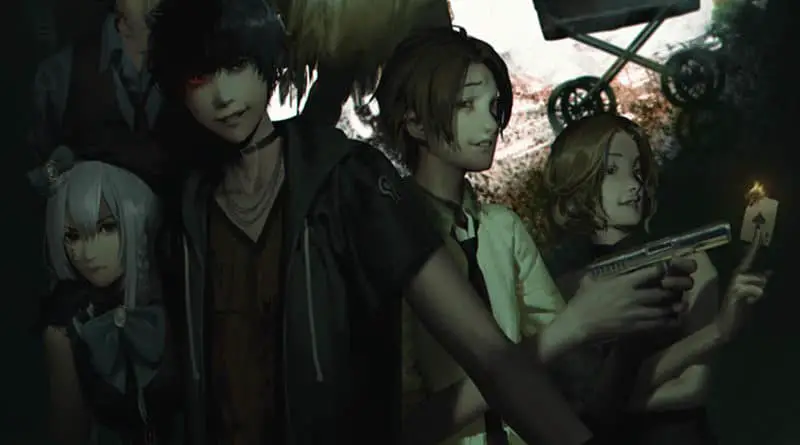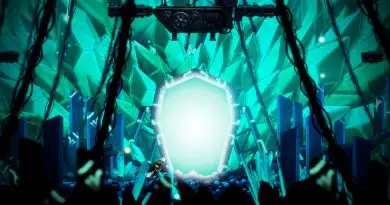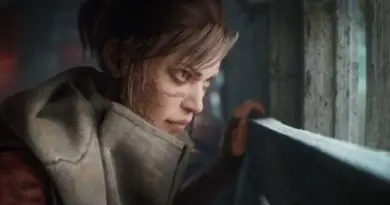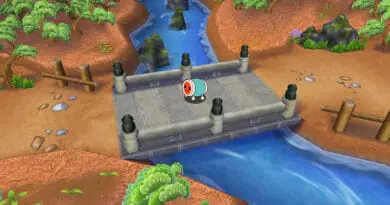Exclusive – Spirit Hunter: NG Novella Killer Peach – Prologue Story
The terror continues as we share the English novella for Spirit Hunter: NG – Killer Peach, which was originally posted to Famitsu for the Japanese release of the game. Aksys Games has allowed us to share this with you, so blame them for the nightmares. Each page is a new chapter, so please enjoy.
In case you missed it, check out all five chapters for the Urashima Woman that we previously shared, prologue chapter first, Chapter 1, Chapter 2, Chapter 3, Chapter 4, Chapter 5.
Please be mindful of potential story spoilers.
NG Prologue Story: Killer Peach [Episode 1]
Author: Ayumu Hosaka
——This story is about a murderer.
The wind carries along with the warm humidity as it snakes through moonlit office buildings.
The day had been an extremely muggy one, a result of it being the tail-end of a rainy spell that is currently plaguing the Shinza Ward in Tokyo.
In anticipation of a future earthquake disaster, this suburb of western Tokyo had become densely packed with commercial buildings and skyscrapers and rapid economic development to match. Moon Tower was one such edifice, a giant commercial construct sitting in the heart of Shinza Ward near Shinza Station.
Noboru Ishimaru, a bigwig in the current ruling party, had this building overlooking the Shinza nightlife built by Sumii Construction, a company headed up by none other than himself. This building stood as a testament to his political power, and he had further plans to flex his strength on more of the city’s development plans.
However, for the past few days, Moon Tower has been devoid of people, the companies that had offices inside the building closed for business.
“It felt like the entire floor was a mortuary.”
That’s how Miss A, who worked inside the building, described the atmosphere to her friend.
She also had an idea of why people had been cleared out of Moon Tower.
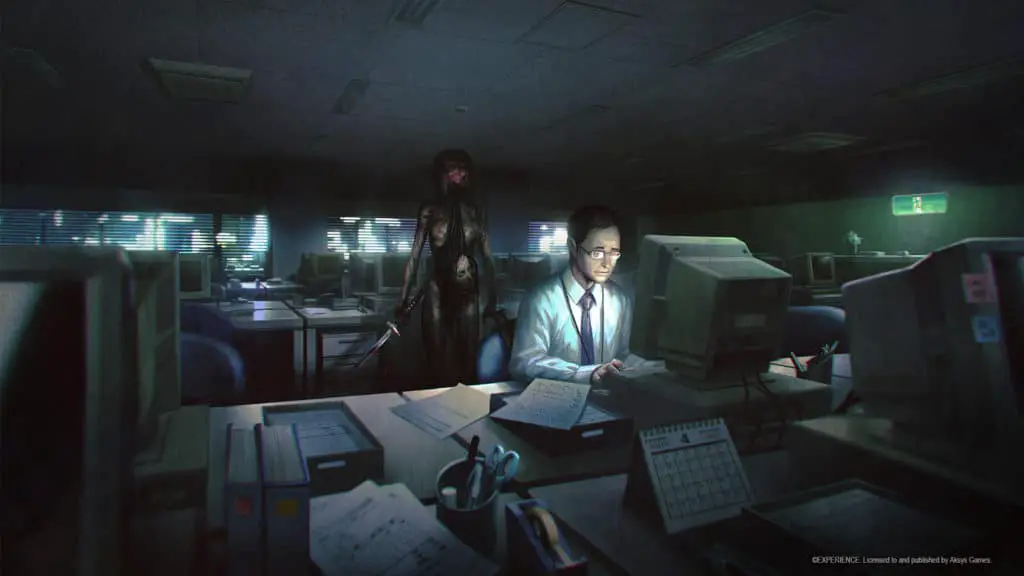
——There’s a demon lurking in that place.
A murderous demon.
The people working there feared it, just like the characters of folktales had lived in fear of demons who would travel to their villages in the night to eat the children.
But Miss A is a bit more familiar with this demon.
After all, she had seen it with her own eyes.
That night, Miss A was burning the midnight oil. Her superior had dumped some tedious document filing on the junior employee and skipped out on time to get home to his wife and child.
Not wanting to start hunting for a new job, she bears the indignity and quietly keeps working, finally finishing the task just before the clock strikes midnight. As she prepares to finally go home, she heads out to the hallway, where she hears the distinct clatter of the keys of a keyboard. It’s from one of the offices for another department.
She thought she was the only one still working on this floor tonight.
“I didn’t expect anyone else besides me would still be working at this hour,” thinks Miss A as she walks past the origin of the sound. But then she hears another sound in addition to the staccato rhythm of the keyboard’s keys hitting its frame.
It sounds like wet footsteps.
To be more precise, it sounds like footsteps made by wet, bare feet walking around on a hard surface.
Is there really an employee walking around barefoot in the office?
For a moment, she thinks that the sounds may be a product of her exhaustion, but, listening more intently, she is able to tell that the footsteps are moving. Close then far, close then far.
This is definitely not her imagination.
——This is coming from inside that office?
Although dubious, Miss A’s curiosity is piqued, and she peers into the occupied office.
A young male employee is sitting with his back towards her, facing his desk, and diligently typing away. Perhaps he was crunching to meet an important deadline because he certainly looks like a focused, hard-working employee with no time to waste.
This isn’t all that unusual.
What surprises Miss A, though, is what she sees behind the man.
A woman is standing there.
Or, it’s what appears to be a woman. The figure is looking down, making it difficult to see her face. The figure is lean and thin, but well-proportioned, and is wearing a suit and skirt. It closely resembles a mature, beautiful woman.
The rest of her appearance is not so normal.
On the one hand, the woman holds a long katana, something that looks like a prop you would see in a Japanese period drama. It glimmers and reflects the lights, light which had been dimmed as part of the company’s energy conservation strategy. On further inspection, the figure’s expensive tailored suit is frayed and torn in some areas. Her outfit is something that definitely would be out of place in a business office at night.
Miss A is further chilled to the bone once the woman looks up.
——I cannot let that thing see me.
Miss A’s fight or flight instincts kick in, as a wave of fear washed over her. She quickly ducks behind a nearby desk. The woman’s face is distorted and too big. No, rather, it’s not simply big, but…
——That woman has three heads.
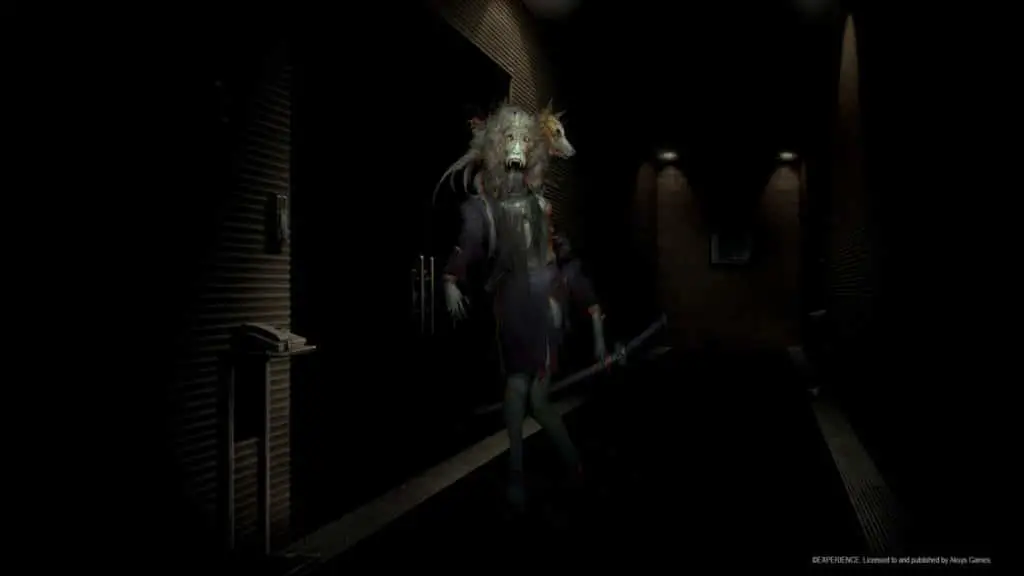
Each is its own distinct face, with separate eyes, separate mouths, and each face is a different creature.
One face is a monkey in heat, with a fierce look that appears as if it’s yelling.
One face is a famished dog, which looks as if it’s howling.
One face is a mother bird in despair over the loss of its child, which seems as if it’s moaning.
This is an astoundingly unusual appearance. It is as if the three animals who serve Momotarou from the folktales were fused together. The three dark sets of eye sockets adorning the three faces quietly gaze at the man. Looking closer, the monkey’s mouth is carrying another head, the long, dark-haired woman’s head.
The woman doesn’t notice Miss A. In fact; she’s not in her line of sight at all. Their eyes are all focused on the man in front of them. The room’s temperature drops sharply. Cold air begins to circulate at her feet as if she had walked into a refrigerator.
‘This can’t still be the Moon Tower,’ thinks Miss A.
——This has to be a dream.
She’s in a nightmare caused by overwork. She must be seeing an illusion. The stress of the job has finally gotten to her, and she’s cracked. That’s the only possible explanation she can think of.
The multi-headed figure closes in on the man’s back, shifting and melting into the darkness of the dimly lit office. Even though Miss A knows that something that cannot be undone is about to befall this man, she cannot bring herself to warn him.
The woman’s shadow closed the distance until it merged with the man’s shadow when she finally raises her sword.
A flash.
A red line divides the moonlit night.
The clacking of the keyboard ceases, and the office is tranquil once more.
——What happened?
Stifling her breath, Miss A looks at the man’s neck. A thin, improbably straight red line runs directly across it. His face suddenly turns to look at her.
——No.
It didn’t turn. The man’s head slides along the line on the neck and falls towards Miss A with a sickening thump.
Just as the head was to hit the floor, Miss A’s eyes met with the man’s. His eyes were still lit with awareness, looking back in disbelief at the woman from a different department watching him from above. At that moment, the man finally realizes that his death is upon him and contorts his face in despair. He looks at Miss A with pleading eyes.
Miss A tenses up at the sight, and there’s where her consciousness fails her, the end of her memory of the night.
The woman that Miss A witnessed that night repeatedly appeared at Moon Tower in the following nights and slew more men. The murder weapon was always a katana with a blade so sharp the cut it made was clean and gruesomely beautiful.
Miss A and the other witnesses to her murders all described that the woman wielding the sword as a vision that was both terrifying, but also inspiring and beautiful. Soon, the woman’s terrifying, yet gallant figure was compared to Momotarou, thus earning her the nickname…
The Killer Peach.
◆◆◆
It’s so easy.
Drifting in and out of a dream, the single consciousness residing in the three heads thinks.
There isn’t much to men.
Counting how many they had killed didn’t offer any comfort; they couldn’t quell the rage urging them forward. They had felt the presence of a woman, too but didn’t pursue her.
——I loathe men.
I loathe the men working here.
But the woman is not subjected to her wrath. Even though this is a being from the realm of the dead to whom gender should have no meaning anymore, women were somehow exempt from her wrath.
The Killer Peach lets her mind float back to her past. Her memories are fuzzy as if shrouded in mist, but she’s able to recall bits and pieces.
She was named Tomoko Okayama.
She was a representative of the Shinza Ward.
She had a husband and a young son.
She thought that she often dreamt at night, but she never wanted to.
Because her dreams were always of murder.
——And they weren’t dreams of being murdered.
Tomoko’s dreams always featured her as the one doing the murdering. In her dreams, the more she killed, the more praise was lavished upon her. Sometimes the voices that praised her were from her husband and her son. Sometimes it would be the voice of her secretary, and at others, it was the voices of her supporters.
But the point was clearly reinforced, the more she killed…the more that Tomoko’s world validated her.
When Tomoko meted out her murderous punishment, the more that society told her that she’d done a “good job.” The odd ramifications of that situation always made her feel terrible when she woke up. To Tomoko, it felt as if someone or something was trying to groom her into someone that could murder people without compunction.
That was why Tomoko tried her best to compartmentalize her own consciousness from her dreams. If she allowed herself to think her persona in the dreams was her true self expressing her own repressed impulses, she might truly go crazy.
——I’m not watching a nightmare; the nightmare is watching me.
That thought allows her to lift a load off her shoulders, but on days that she had the murder dreams, she didn’t get much work done. She’s able to disguise her sleep deprivation when interacting with other representatives, but those close to her can see past her facade.
That morning, her secretary notices how pale Tomoko is and comes up to her with a worried look on her face. She’s about the same age as Tomoko and is a skilled and trustworthy secretary, and Tomoko views her as highly as extended family, but she did have a habit of being a bit too friendly. Even now, as they’re sitting next to each other in the back seat of a moving car, they’re so close together that Tomoko feels every breath on her own bangs.
“Ah, Mrs. Okayama. You look tired. I heard you stood up against Representative Ishimaru again pretty fiercely yesterday?”
“Yes, I did… But I think you should calm down a little.”
At Tomoko’s advice, she finally notices the lack of distance between them and takes up a more standard position. The driver’s wry smile lets on that he realizes that this banter helps Tomoko relieve some of the stress in her daily life.
Tomoko Okayama has a well-earned reputation for being “too strong,” both as a representative and as a woman. And because of that, she had also earned herself many enemies. A headstrong individual as far back as her days at university, Tomoko was often the leader of her communities.
Unsatisfied with the secure but limited future that awaited her, she decided to become a news reporter and managed to land a job at a flagship station. Afterward, her fresh and incisive reporting resonated with viewership. She married a fellow journalist that she met through work. At 25, she had her first child and retired as a reporter, and a mere two years later, she went into politics.
Striving to build a society where children could thrive and grow without fear or worry, she threw herself into the traffic war that had reignited after 1980. She championed for redeveloping roads to decrease accidents by young drivers and pledged to enact countermeasures against the increasing petrochemical smog. She gained the support of the ruling political party in power as well as homemakers who also were raising children.
At age 27, she became the representative of Shinza Ward and gathered even more attention than she did as a TV news reporter.
For the women of her generation, Tomoko was a hero.
However, since the olden days, heroes were born oniko or children of demons. Progressive concepts like “career woman” hadn’t fully settled in Japanese society, and in the realm of politics, it was especially unheard of. Many were not happy that a mother with a young son was entrusted with power over a city, over the country. As a reflection of that mistrust and ignorance, many political critics dragged Tomoko’s name through the mud, and certain media outlets intensified that.
Noboru Ishimaru, in particular, especially loathed Tomoko.
Ishimaru was a big-name politician that also ran a number of general contracting companies. Of all Tomoko’s detractors, he was the one that held the most influence. For someone like him, who has aspirations of controlling the economy of the nation, and Shinza Ward as his base of power, Tomoko’s resolve of steel was a particularly troublesome obstacle.
Female representatives were pretty rare, so just for that, Tomoko was always going to stand out. However, many social issues were more heavily borne by women, and for those issues, Tomoko wasn’t prepared to turn a blind eye to any of them. Her intransigence on these issues further rankled Ishimaru and had pushed him to publicly criticize Tomoko, which in turn, emboldened his supporters to mock her.
But the silent majority and the repressed women of society kept cheering on and supporting Tomoko’s campaign.
Her secretary counts herself as one of her supporters, too.
She agreed with Tomoko’s political stance and had built up quite an impressive resume of her own. One day, brimming with passion, she knocked on Tomoko’s office door and offered to help in any way possible.
“You always push things too hard when you’re on your own.”
Tomoko can’t help but laugh at the lecture. She dreams that perhaps if she had a daughter that she could raise properly, they would grow to become a strong-willed woman like her secretary.
——I used to say the same thing to my mother when I’d take the housework from her.
Tomoko’s father was a stereotypical Japanese man who never set foot in the kitchen. It wasn’t that her father was malicious or oppressing, but rather, as Tomoko now understands, it was just commonplace behavior, and nobody had thought to speak up about it. Her mother was still hale and hearty, and nothing about her demeanor implied that she hated her station. It wasn’t an unhappy situation.
But times have changed. Progress has come.
There were more jobs that needed to be done, and the country had gotten too large to adhere to those old norms. There were also not enough stewards to protect the children. In a nutshell, the infrastructure lacked the social support it needed. If they wanted to adapt to the changing times, they needed to discard the old mindset that was holding them back.
The women needed to step forward.
And the men needed to step back just a little.
To make that a reality…
“Someone has to push as hard as possible,” Tomoko declares.
——I have to become stronger.
Tomoko, sleep-deprived from her dreams, gives herself a mental pep talk.
She feels like she must become stronger and build up a bigger base of power as a representative for the children living now, for those yet to be born, and for the mothers.
——I’ll gladly endure being called a demon if I can make that happen.
If she didn’t devour humans, the frigid wasteland of her dreams would devour her.
This post may contain Amazon affiliate links. As an Amazon Associate Noisy Pixel earns from qualifying purchases.
